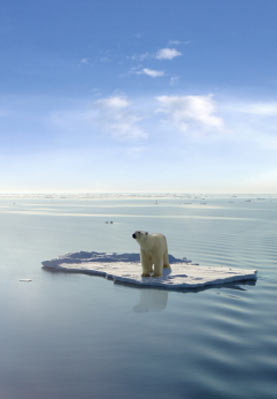
“UK companies are lagging on targets to reduce greenhouse gas emissions”
“Emissions are falling at 0.5% per year, whereas 2-3% is needed to meet targets”
“UK scientists say the global average temperature could rise by 4C as early as 2060”
“Less than half of the British think that climate change will affect them during their lifetime – and less than 20% believe their children will be affected by global warming”
Department of Energy and Climate Change
It’s not all bad but there’s more to do
The good news is that some of our top companies are showing a year on year improvement in the data they disclose. And, although the highest ever levels of emissions have been disclosed, this seems to be because more companies are able to measure and report their emissions accurately. And most of the FTSE100 do identify their responsibility KPIs and report progress against their responsibility targets.
However, there is more to do. Only 35% of the FTSE 350 disclosed reduction targets; this is lower than the 51% disclosure rate of the Global 500. Sadly, this means that the actual levels of emissions are likely to be a lot higher than disclosed this year.
What more could you do?
Some companies have signed up to the Copenhagen Communique (many from the FTSE 100); others (including many smaller businesses and individuals) have committed to the 10:10 project. This kind of public commitment, along with measurable targets and disclosure of progress towards those targets makes it more likely that you’ll reach those targets.
This is all highly commendable: indeed, vital. But we need more, and I think this is about mindset, both corporate and individual.
Corporate Mindset: Opportunity or Risk?
24% of companies identify the introduction of the Carbon Reduction Commitment in April 2010 as an opportunity (though more see it as a risk).
A quick survey just through the A’s in the FTSE 100 reveals that several are promoting their response to climate change as a business advantage:
“AMEC is at the forefront of many new innovations from low-carbon energy production, carbon capture and storage to assisting customers in carbon-proofing their management systems.”
“While recognising our role as a major producer of coal, we’re also working to meet the operational, environmental and social challenges of doing business in a carbon-constrained future… We have succeeded in capturing … methane at several of our collieries and converting it into saleable energy. Instead of venting this gas, we are using it to generate electricity or supplying it to industrial users in the form of natural gas. These enterprises also improve mine safety and our bottom line.” (AngloAmerican)
“We were the first insurance company to be carbon neutral across our worldwide operations. 77% of our people think we act responsibly towards the environment.” (Aviva)
Is there an opportunity for your business?
I’m not saying that climate change doesn’t present a risk (because it does, obviously); just that it may be possible to find the positive, and work for an approach that benefits the business as well as the environment, without greenwashing.
Individual Mindset
Businesses of all sizes and all industries clearly have an impact on emissions and therefore on climate change, though the problem isn’t due to business alone; over 40% of UK’s CO2 emissions are a result of personal choices.
Why is there this wide disconnect between what scientists are predicting, and what people believe?
The New Scientist recently published a very interesting article about climate change as a cultural and psychological phenomenon, and outlines four different ‘stories’ we tell ourselves about climate change:
- Edenic myth: describes our climate as part of a fragile natural world we need to protect
- Apocalyptic myth: uses the language of fear and disaster to promote a call for action to prevent climate change
- Promethean myth: describes climate as something we need to control, but can’t
- Themisian myth: talks about climate change using the language of justice and equity, calling for environmental justice.
This is like marketing to different niche groups. Your audience might reject the idea of climate change if presented in the Themisian myth, with the response that “it doesn’t matter what I do as an individual when country X doesn’t do anything”, while if the audience had been presented with the Edenic myth, they might be more responsive.
Like the seatbelt campaign to change people’s mindsets, persuading people to take action to deal with climate change might take years, but it needs to be done. Society is still working on changing the attitude of drivers to drink-driving; but change is coming. Nowadays it is the norm to clunk-click every trip; it must become the norm to consider climate change as readily as one would consider personal safety.
What has climate change – and perspective change – to do with corporate websites?
Your corporate website visitors are there for a variety of reasons: some business, some personal. Your corporate statement on climate change and responsibility will be read by many of them:
- Investors and analysts – who want to understand the risks to your business but also the potential opportunities
- Journalists – looking for the story about your business and its impact on climate change (so make it a good one!)
- CSR analysts and activists – who want to understand your impact on climate change and your actions to mitigate those
- Job seekers and customers – who are increasingly interested in green issues and your corporate responsibility strategy
All those visitors may be professionally interested in your climate change story, but it will also have a personal impact on them and – even if only subliminally – strengthen their awareness of the breadth and significance of the climate change issues and of the responsible actions that so many organisations are undertaking across society.
So what mindset does your website appeal to?
Do you see climate change as an opportunity as well as a risk?
Are you helping to shift the perspective of society?
Are you changing people’s minds about your business as well as about climate change?
 This post is part of Blog Action Day, which this year is discussing climate change.
This post is part of Blog Action Day, which this year is discussing climate change.
Previous contributions to Blog Action Day were:
2008: Celebrating the FTSE 100: action on the breadline
2007: Enticing the green investor
Lucy is Editor at Corporate Eye


